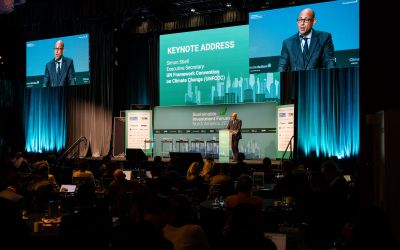How climate change influenced Brunel’s strategy
In this Q&A, Faith Ward, chief responsible investment officer at Brunel Pension Partnership, tells FTSE Russell’s Aled Jones how Brunel is integrating climate change risk into its investment policy.

In this Q&A, Faith Ward, chief responsible investment officer at Brunel Pension Partnership, tells FTSE Russell’s Aled Jones how Brunel is integrating climate change risk into its investment policy, including plans for new passive funds tracking the FTSE Paris-Aligned Benchmark (PAB) series.
Brunel Pension Partnership is one of the UK’s eight national local government pension scheme pools, managing more than £35bn for the pension funds of Avon, Buckinghamshire, Cornwall, Devon, Dorset, the Environment Agency, Gloucestershire, Oxfordshire, Somerset and Wiltshire. Brunel was integrally involved in the development of the FTSE Russell EU PABs.
Aled Jones: What motivated Brunel to seek to launch passive funds tracking an EU Paris-aligned benchmark?
Faith Ward: In seeking to implement our Climate Change Policy, published in January 2020, we recognised that, as it relates to passive portfolios, the lack of Paris-aligned benchmarks was an impediment to our aspirations of decarbonising our investment portfolios, managing climate risk and achieving our net-zero ambitions.
Our pension fund clients also wanted us to find benchmarks that would support product design and enable smarter products but also that really captured the essence of t real-economy changes needed to meet the Paris Agreement targets. That meant more than just managing Brunel portfolios’ fossil fuel exposures and carbon emissions. We wanted to look holistically at what ‘Paris-aligned’ really means.
Aled Jones: Why did you decide to work with FTSE Russell on this project?
Faith Ward: Given the depth of our climate investing focus, we wanted to be deeply involved in the actual development of the indices themselves, rather than merely end-users. When we launched our project to research benchmarks that could create a fund tracking Paris-aligned benchmarks, we looked at the available offerings from different index providers and prioritised finding an approach based on partnership. We recognised that this was going to be a long-term relationship. Not only did we need to find solution that met pool funds’ needs today, but one that could adapt to the accommodate future needs, recognising the evolution in data quality and availability. We’ve ended up working with FTSE Russell because it’s been a collaborative project from the outset.
Aled Jones: How confident are you that investing with climate goals in mind is consistent with your obligation to ensure long-term financial returns for your pension fund clients and their beneficiaries?
Faith Ward: Brunel considers environmental, social and governance risks as part of our fiduciary responsibilities. We look at our fiduciary duty in a very holistic way, we strongly believe that long-term financial returns are best achieved by investing sustainably.. In other words, we are interested in what is in the long-term interest of our funds’ beneficiaries, recognising the economic and social realities of the world in which those beneficiaries will retire, not just the monetary value of the pension – investing for a world worth living in.
The transition towards a net-zero society and economy will be bumpy at times, but there’s ample and increasing evidence of the potentially catastrophic financial impact of failing to deal with global warming.
Climate change is a systemic issue that will have significant physical and economic impacts on many different aspects of human activity, affecting all the asset types we hold as investments. At the same time, climate change can also represent an investment opportunity. Our investment objectives are framed in achieving climate risk-adjusted long-term returns, not just risk-adjusted returns, which may be too short-term to capture the real risks to pension funds.
And we have to consider whether we have aligned our investments to the objectives we have set ourselves. Six of our clients have made public commitments to achieving net-zero carbon emissions by 2050 or sooner. Our overall investment framework has to reflect this ambition.
Aled Jones: From the perspective of the broader pension fund community, how impactful is Brunel’s work on sustainable investment?
Faith Ward: We have always striven to be a leader in this area, as well as working collaboratively with others in similar situations, especially those within the local government pension scheme family. We’ve tried to find solutions that we think will benefit the long-term savings industry as a whole. In an area like climate change in particular, it doesn’t make much sense for institutions to be acting on their own. Working with FTSE is one example. We can’t just solve problems for ourselves—we need the whole economy to engage in the shift.
Aled Jones: The next UN Climate Change conference (COP26) will take place later this year. How important is it in setting the sustainability agenda?
Faith Ward: It’s absolutely critical. We’ve recently seen momentum building up with policy makers paying more attention to climate change, notably at the June 2021 G7 summit in Cornwall. But there’s still a long way to go to convert policy promises into more granular, specific policy objectives backed by tangible action plans. .
Aled Jones: What are the main challenges in implementing climate change policy?
Faith Ward: The critical challenge is how to make the climate change transition in a socially inclusive fashion but also in a way that really delivers. We have to pursue climate solutions that do not penalise the vulnerable and the marginalised. Brunel is focused on real economy changes and supporting companies and their employees in those changes. Whilst wanting to provide clear signals about the changes needed to continue to be investable, we were keen to minimise large scale exclusions – the implementation of the index will be complemented by a significant stewardship programme.
Success for Brunel will be minimising the number of companies dropping out of the benchmark because they have not kept pace with the decarbonisation needed to meet Net-Zero.
I don’t think we should be under any illusions: meeting that challenge is going to be really hard.
There isn’t yet a global consensus on how far and how fast we should take things forward. There’s also a desperate need to find practical solutions that move us all in the right direction. I really feel strongly that our Paris-aligned benchmark project is a good example of how to achieve tangible change.
Aled Jones: How well-aligned are policymakers’ and global investors’ views in this area?
Faith Ward: Increasingly so. For example, the recently released International Energy Agency (IEA) roadmap[1] was the first comprehensive study of how to transition to a net-zero energy system by 2050, while ensuring stable and affordable supplies, universal access and robust economic growth. We were encouraged to see that the IEA’s research was very much in line with what we were already doing and thinking.
And the Institutional Investors Group on Climate Change (IIGCC), the European membership body for investor collaboration on climate change, published its Net-Zero Investment Framework[2] in March this year. The framework provides a standardised framework for how to become a net-zero investor. It provides practical actions, useful methodologies and sets guidelines for metrics and targets. It also makes clear recommendations that investors should not allocate additional capital to thermal coal or oil/tar sands. Brunel has played an active role in developing and supporting this framework and it forms the basis of our approach across asset classes.
Aled Jones: Do net-zero investment frameworks need to evolve?
Faith Ward: Though we have come a long way in arriving at common investment frameworks, it’s important that they are dynamic. That means we need to ensure they continue to be fit for purpose and meet their stated objectives. For example, the benchmarks may need to bring in new data points as we go forward.
It’s worth mentioning the role of banks as an example. Their own operations can be relatively low-impact from a climate perspective, but they play a critical role in financing fossil fuel-related activities. In April, the IIGCC called on banks to set enhanced net zero targets by 2050, scale up green finance and withdraw from projects that fail to meet Paris Agreement goals[3]. We anticipate being able to factor how banks are addressing the issue into the benchmark construction in the future, but for now FTSE have ensured we don’t overweight our exposure.
One of the things that attracted us to FTSE Russell’s EU Paris-aligned benchmark approach was that they have committed to a forward-looking approach in index design. That means working with the IIGCC and other asset owner-led initiatives to incorporate new ways of measuring climate risk.
Aled Jones: What changes have you witnessed from across the financial industry in terms of people’s preparedness to meet climate change goals?
Faith Ward: I’ve been involved in sustainable finance and responsible investment for all my working life. In more recent years, I’ve specifically focused on climate change and climate risk. But the changes I’ve witnessed of late have been quite startling. All of a sudden, I feel as if I’m pushing on an open door. Everyone wants to hear about what we are doing: from asset owners and pension fund trustees to asset managers and policymakers. The demand to take action has accelerated enormously.
And the speed with which people go from accepting general principles to implementing quite sophisticated solutions, such as those embedded in the FTSE Russell EU Paris-aligned benchmark series, is also remarkable and encouraging.
Aled Jones: How important are index investing and benchmarks in helping achieve climate change goals?
Faith Ward: We see index-based funds as playing a critical role. They offer diversified, low-cost access to climate change investment solutions. Index funds have also long played a foundational role in most of our partner funds’ asset allocations.
We also anticipate using the benchmarks to support the management of climate risk across all our listed portfolios, which we also aim to decarbonise to meet Net Zero objectives. They are increasingly a policy tool as well. The EU’s recent initiative to develop and define Paris-aligned and Climate Transition benchmarks is a great example of this trend.
Benchmark diversity is also important. Well-known indices, like those using a market capitalisation weighting approach, have many uses. But they are also somewhat indicative of ‘business as usual’ and, by themselves, they won’t deliver on a net-zero climate objective.
That’s not a criticism of market-cap indices, which are widely used. They merely reflect the economy in which they are operating. And, to a large extent, our economy still doesn’t price in the externalities associated with climate change.
So we need initiatives like the new FTSE Russell EU Paris-aligned benchmark series to help take us in our required direction of travel.
[1] https://www.iea.org/reports/net-zero-by-2050
[2] https://www.iigcc.org/resource/net-zero-investment-framework-implementation-guide/
[3] https://www.iigcc.org/resource/investor-expectations-for-the-banking-sector/
To learn more about FTSE Russell click here.
© 2021 London Stock Exchange Group plc (the “LSE Group”). All information is provided for information purposes only. Such information and data is provided “as is” without warranty of any kind. No member of the LSE Group make any claim, prediction, warranty or representation whatsoever, expressly or impliedly, either as to the accuracy, timeliness, completeness, merchantability of any information or of results to be obtained from the use of FTSE Russell products or the fitness or suitability of the FTSE Russell products for any particular purpose to which they might be put. Any representation of historical data accessible through FTSE Russell products is provided for information purposes only and is not a reliable indicator of future performance. No member of the LSE Group provide investment advice and nothing contained in this document or accessible through FTSE Russell products should be taken as constituting financial or investment advice or a financial promotion. Use and distribution of the LSE Group data requires a licence from an LSE Group company and/or their respective licensors.






